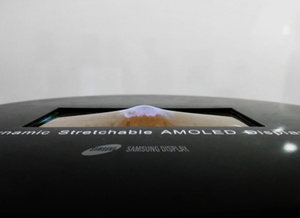 There are a few futuristic concepts in smart devices that are are persistent as the flexible display. Companies, especially the couple Korean ones, have been trying to create different kind of flexible and stretchable displays for quite some time.
There are a few futuristic concepts in smart devices that are are persistent as the flexible display. Companies, especially the couple Korean ones, have been trying to create different kind of flexible and stretchable displays for quite some time.
One of the examples of this is of course the LG G Flex introduces first in 2013 and its successor Flex2. Samsung has been twisting displays in its own right with the curved displays since Note Edge, and now even with its most popular flagship Galaxy S8.
Now Samsung has unveiled a new kind of display that might revolutionize the smart devices yet again. This time it is a stretchable OLED display, first of its kind, the company says. The technology is on display at a international SID conference and you can also see it in action in a YouTube video below.
The display featured in the video is a 9.1 inch OLED panel – if you can call it a panel anymore – that would fit perfectly in a traditional tablet. Instead it stretches like a fabric. The stretch height is at maximum 12 millimeters, just under half an inch, so it can't compare to rubber-like materials, though.
Currently the technology is still very much a concept and needs more development. There still doesn't seem to be any real life applications for it but surely someone will come up with a use for that.
Now Samsung has unveiled a new kind of display that might revolutionize the smart devices yet again. This time it is a stretchable OLED display, first of its kind, the company says. The technology is on display at a international SID conference and you can also see it in action in a YouTube video below.
The display featured in the video is a 9.1 inch OLED panel – if you can call it a panel anymore – that would fit perfectly in a traditional tablet. Instead it stretches like a fabric. The stretch height is at maximum 12 millimeters, just under half an inch, so it can't compare to rubber-like materials, though.
Currently the technology is still very much a concept and needs more development. There still doesn't seem to be any real life applications for it but surely someone will come up with a use for that.













